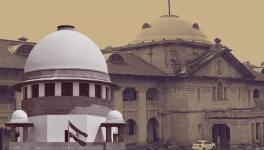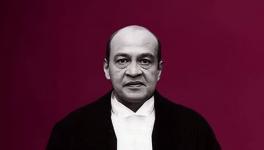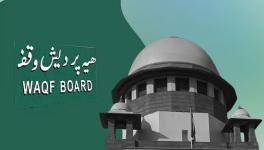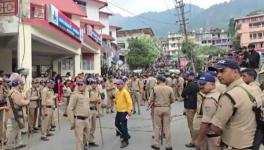Gyanvapi Case: Copy-Paste Pattern a la Babri Case - Not Just Legally But Politically, Too?
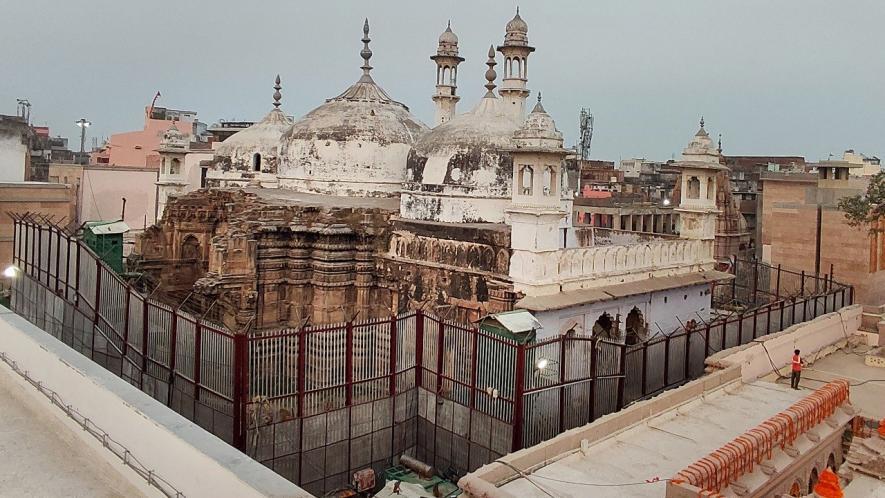
Image Courtesy: PTI
New Delhi: The September 12 Varanasi district court order in the Gyanvapi mosque case has triggered serious concerns among legal luminaries, historians, the Muslim community and its religious leadership — with all of them unanimously implying that the order has ‘potential’ to push the country back to the 1990s when communal atmosphere engulfed the country.
They said the entire episode seems to be following a “copy-paste pattern” in the lines of the Babri Masjid-Ranmbhoomi case, not only legally but also in terms of real politics.
They point out that the worship demand at the western wall outside the railing barricading the Gyanvapi mosque has been seemingly dragged from the Ram Chabutra which had later emerged as the focal point of the Babri mosque case.
The Muslim community has unequivocally raised concern over the “judicial overreach” of the lower court — which, according to them, disregarded the Place of Worship Act, 1991 in letter and spirit.
“It is tantamount to open the floodgates for pleas/applications, seeking legal recourse to claim ownership over historical places, causing litigation and social discord,” a Muslim community member told NewsClick.
District Judge A K Vishveshva dismissed an application filed by the Gyanvapi mosque’s managing committee that had challenged the maintainability of the suit filed by five Hindu women, seeking the right to worship Hindu deities within the mosque premises all-year round.
The judge noted that the petitioners are seeking neither conversion of the Gyanvapi mosque into a Shiv temple nor are making any claim to ownership. They are merely seeking a right to worship as a civil right; and therefore, the petition is not barred by the Places of Worship (Special Provisions) Act, 1991, the Waqf Act 1995 and the UP Shri Kashi Vishwanath Temple Act, 1983.
“The plaintiffs are only demanding the right to worship Maa Sringar Gauri and other visible and invisible deities which were being worshipped incessantly till 1993 and after 1993 till now once in a year under the regulation of State of Uttar Pradesh. Therefore, the Places of Worship (Special Provisions) Act, 1991 does not operate as the bar on the suit of plaintiffs,” the court said.
The Act, legislated by Parliament in the backdrop of the Ramjanmabhoomi agitation, freezes the status of religious places as they existed on August 15, 1947.
He also held that the entry of the property as Waqf in the revenue records, as per settled law, does not create ownership rights.
NEITHER DEFEAT NOR VICTORY
The mosque’s panel counsel in the Supreme Court, Fuzail Ahmad Ayyubi, who is an advocate on record in the apex court, described the Varanasi district judge’s rulings as a “setback”.
“It is not a final verdict, so calling it a victory or defeat does not make sense. At max, you can call it a setback for us,” he told NewsClick, adding that even after the pronouncement of the order under Order 7 Rule 11, the status of the mosque — as directed by the Supreme Court — shall remain the same.
Ayyubi said the order has already been challenged in the Allahabad High Court, and they are hopeful that they would be able to convince the court.
Asked what would be their arguments in the High Court as all of their objections were rejected by the district court and maintainability of the pleas was decided on the averments made in the plaints, he refused to divulge the new strategy — saying they are “well-prepared to present the case effectively”.
‘SHOW BIG HEARTS’
Noted legal expert, Faizan Mustafa, former vice chancellor of The National Academy of Legal Studies and Research (Nalsar) University of Law in Hyderabad, said much reliance on law to resolve social or religious disputes is the real problem.
“Laws are amended and struck down and often undergo judicial interpretations. At the core of the debate is the Places of Worship Act. We must understand that the legislation is yet to pass a test of constitutionality in the Supreme Court. It’s not clear if the reference to the law in the Ramjanmbhoomi-Babri Majid case was a passing remark. If it was an obiter dictum, then it’s certainly not a law,” he said during his monologue on his YouTube channel ‘Legal Awareness Web Series’.
Section 3 of the Centrally-enacted law bars the conversion, in full or part, of a place of worship of any religious denomination into a place of worship of a different religious denomination — or even a different segment of the same religious denomination.
Its Section 4(1) declares that the religious character of a place of worship “shall continue to be the same as it existed” on August 15, 1947.
Section 4(2) states any suit or legal proceeding with respect to the conversion of the religious character of any place of worship existing on August 15, 1947, pending before any court, shall abate — and no fresh suit or legal proceedings shall be instituted.
Section 5 of the law stipulates that the Act shall not apply to the Ramjanmabhoomi-Babri Masjid case, and to any suit, appeal or proceeding relating to it.
A five-judge Constitution bench comprising then Chief Justice of India Ranjan Gogoi and Justices S A Bobde, D Y Chandrachud, Ashok Bhushan and S Abdul Nazeer had lauded the Act in the Ramjanmbhoomi-Babri Masjid judgement as a legislative instrument designed to protect the secular features of the Indian polity, which is one of the basic features of the Constitution.
“The law addresses itself to the State as much as to every citizen of the nation The State, has by enacting the law, enforced a constitutional commitment and operationalised its constitutional obligations to uphold the equality of all religions and secularism which is a part of the basic features of the Constitution. The Places of Worship Act imposes a non-derogable obligation towards enforcing our commitment to secularism under the Indian Constitution. The law is hence a legislative instrument designed to protect the secular features of the Indian polity, which is one of the basic features of the Constitution The Places of Worship Act is a legislative intervention which preserves non-retrogression as an essential feature of our secular values,” states the SC verdict.
Mustafa said in his talk that the Varanasi district judge’s observation that the Places of Worship Act prohibits conversion of a place of worship of any religious denomination into a place of worship of a different religious denomination but does not bar ascertaining the religious character of a place of worship will open Pandora’s box.
“There are hundreds of such contentious matters, which will go to courts for consideration. It would lead to communal politics and contribute to the spread of hatred in society. If the legislation does not stop ascertainment of the religious character of a place of worship, then its very essence is lost. The law was enacted with the objective to freeze all such religious disputes,” he said.
He stressed the need for an amicable solution to the dispute.
“Court cases result in victories and defeats, but arbitration, mediation and out-of-court settlement give out a sense of victory to both parties as both of them lose and gain in this process. Every action should not be considered a surrender. Compromises have a role in a civilisational history to attain a higher goal. But at the same time, minorities are not always supposed to do compromises, the majority too have to and should do it. There should a feeling of accommodation and mutual trust,” he said, asking the two sides to “show big heart”.
“Sit together and find out a solution without involving politicians and groups who have vested interests. Understand and respect each other's sentiments and reach a compromise. Extremely complex issues are resolved on negotiation tables. Litigation is not a good method of dispute resolution. It should be avoided,” he suggested.
He said the principle of non-retrogression that was talked about in the Babri verdict should also be considered.
The apex court in the Ramjanmbhoomi-Babri Masjid verdict had taken note of attempts to change the character of places of worship by people taking law into their own hands, citing historical events.
“Historical wrongs cannot be remedied by the people taking the law in their own hands. In preserving the character of places of public worship, Parliament has mandated in no uncertain terms that history and its wrongs shall not be used as instruments to oppress the present and the future,” it had observed.
Mustafa does not find the final verdict in the Gyanvapi case would be different from the verdict of the Varanasi district court’s order as the district judge, as per his observations, seems to be convinced by the claims made by the petitioners.
Delhi-based columnist Yawer Rahman, agreed with Mustafa, saying fighting over mosques and temples was against the spirit of Islam.
“In Babri Masjid case, the Muslims should have shown large-heartednesses then by willingly gifting the site claimed by the Hindu parties for the sake of peace and brotherhood. In fact, Ali Mian (Maulana Abul-Hasan Ali Nadwi, then president of All India Muslim Personal Law Board or AIMPLB) had, following the true Islamic spirit, agreed to hand over the land and even held talks with the then Prime Minister VP Singh. But then, there was a lack of consensus among the AIMPLB. Politics took precedence, leading to decades of discords between the two communities,” he told NewsClick.
“In fact, politicians from both sides didn’t want an amicable solution. They wanted to reap political benefits out of it, clearly at the cost of ever-lingering conflict between the major communities,” he added.
When asked, “yesterday it was Babri, it is Gyanvapi and Shahi Idgah mosques today, and this would continue in the future as well; how long do Muslims have to keep giving up their places of worship?”, he said: “Give up all of them if it satiates their hunger as establishing peace, harmony and co-existence is what our religion preaches, not discord in the name of mosques. And be sure, when you will show large-heartedness, a majority of the country will embrace you.”
Maulana Yasoob Abbass, general secretary of the All India Shia Muslim Personal Law Board, too, advocated an out-of-court settlement of the dispute.
“Religious leaders from both sides should sit together and resolve the issue peacefully,” he added.
A MONUMENT OF HISTORICAL IMPORTANCE
Historian Ali Nadeem Rezavi, professor of medieval history at Aligarh Muslim University, told NewsClick that the Gyanvapi mosque should be looked at through the prism of a “monument of historical importance” instead of a place of worship.
“As a historian, I am not interested in a mosque or a temple. Gyanvapi mosque is a monument of historical importance that was constructed in 1669 upon the demolition of a temple, and it should be preserved in its original condition for posterity. It will serve as a source for research on the architecture of temples of the Aurangzeb era,” he said, adding that the Indian History Congress too had opined the same in 1985.
He said monuments have their role in preserving cultural heritage and history. Such symbols of different periods show the architectural growth of the country from the past to the present.
“The Congress (the Indian History Congress) had even proposed the government to bring such ancient structures under the umbrella of the Ancient Monuments Act (Ancient Monuments and Archaeological Sites and Remains Act, 1985) for preservation,” he added.
Like Hindus, he said, Buddhists too can claim their religious places and heritage were brought down to build temples. “This practice must stop in the larger interest of the country,” he concluded.
‘SANGH HAS INFILTRATED JUDICIARY’
Naved Hamid, president of All India Muslim Majlis-e-Mushawarat — a federation of various Muslim organisations in India, said the issue has been raked up “not only to polarise the society but also to gain votes in 2024”.
“It is surprising that the lower court has ignored the Places of Worship Act in letter and spirit, and it will have long-term law and order problems in the country,” he told NewsClick, alleging that the “Sangh’s ideological torch bearers have infiltrated the judiciary.”
“Ironically, the ideological torch bearers of the Sangh (the Rashtriya Swayamsevak Sangh or RSS) have infiltrated into the judiciary. The verdict is a testimony of the ideological battle that has been entrusted on the Muslim minority of the country,” he added.
‘GYANVAPI CASE GOING BABRI WAY’
Reacting sharply to the Varanasi court order, Syed Qasim Rasool Ilyas, spokesperson of AIMPLB, equated the Gyanvapi case to the Babri Masjid-Ramjanmbhoomi title dispute.
He claimed the order had failed the purpose of the Places of Worship Act 1991.
“The order has negated the Supreme Court judgment in the Babri Masjid case where in it had taken note, in no uncertain terms, of attempts to change the character of places of worship,” he said.
The top court had said in preserving the character of places of public worship, Parliament has mandated that history and its wrongs shall not be used as instruments to oppress the present and the future.
He said the case may meet the same fate as the Babri mosque.
“The Hindu women petitioners had sought to worship throughout the year at the western wall of the Gyanvapi compound that is outside the barricaded area of the mosque, but the court of civil judge (senior division) while doing judicial activism went overboard and ordered a survey inside the mosque premise. The case is going on the same path as that of the Babri Masjid dispute wherein the right to worship was first sought on the Ram Chabutra outside the iron grill of the mosque and later the petitioners staked a claim on the entire mosque,” he concluded.
The Jamaat-e-Islami Hind (JIH) voiced concerns over the recent developments and urged the Allahabad High Court to uphold the 1991 Act to protect Gyanvapi and other mosques in the country.
“It was widely believed that the Supreme Court observations on the Places of Worship Act in the Babri Masjid case would resolve all mosque-temple disputes forever, but the Varanasi court order disregarded both the legislation and the apex court of the country. It may lead to mushrooming litigations across the nation,” JIH Vice-President Prof Mohammed Salim Engineer told NewsClick.
When reminded of the lower court’s observation that the Act prohibits alteration, not the ascertainment of the religious character of a religious place, he said, “worship rights have tactically been sought in the compound through the lawsuit, and it is an indirect attempt to defeat the spirit of the legislation.”
He said the government and the courts are duty bound to uphold the law in letter and spirit.
‘THE ORDER TO EMBOLDEN COMMUNAL FORCES’
Refusing to comment on the intention of the Varanasi district court’s order, Quamar Ashraf, senior journalist and media analyst who works for a UN agency, said the order will “certainly embolden communal forces.”
“It will unleash a Pandora’s Box...it is not going to be limited to this place alone. And why should it be? If the Places of Worship Act can be interpreted to resume hearing for the Gyanvapi case, then why not the other places of worship?” he asked.
He said the communal fabric of the country was fraying due to “dog whistle politics.”
“You cannot reason with religious zealots, mostly having tacit support from the incumbent government, in the current situation. The issue has the potential to push us back to the 1990s when communalism was streamlined deep into the country,” he added.
He said Muslims have nothing in their hands except to take legal recourse, “the result of which is obvious”. “After all, the Babri Masjid case has sent a shockwave across the legal experts and Muslim intelligentsia,” he concluded.
Senior journalist Mohammad Ali, who has written extensively on the growth of the Hindu Right Wing and its onslaught on Indian democracy, sees the lawsuit filed by the women worshippers as part of the “ongoing Hindutva project to turn India into a Hindu majoritarian state.”
“It looks at history through the prism of religion, when it is not. Had history been driven by religious motives, Hindu kings would not have demolished temples, Ashoka would not have killed millions of Hindus in Kalinga and Mughal emperors would not have appointed Hindus on key posts,” he said.
If Hindus want to correct ‘historical wrongs’, they should make attempts to restore thousands of Buddhist shrines demolished in the past by brahmanical rulers, he said.
Providing evidence from the book ‘Against the Grain: Notes on Identity, Intolerance and History’ authored by renowned historian DN Jha, he said, “Some present-day brahmanical temples, such as those of Bhuteshwar and Gokerneshwar, were Buddhist sites in the ancient period in Mathura.”
“As described by Jha in his book, central to Hindutva perception is the belief that Muslim rulers indiscriminately demolished Hindu temples and broke Hindu idols. They relentlessly propagate the canard that 60,000 Hindu temples were demolished during the Muslim rule, though there is hardly any credible evidence for the destruction of more than 80 of them,” he said, adding that “demolition and desecration of rival religious establishments, and the appropriation of their idols, was not uncommon in India before the advent of Islam.”
Get the latest reports & analysis with people's perspective on Protests, movements & deep analytical videos, discussions of the current affairs in your Telegram app. Subscribe to NewsClick's Telegram channel & get Real-Time updates on stories, as they get published on our website.















